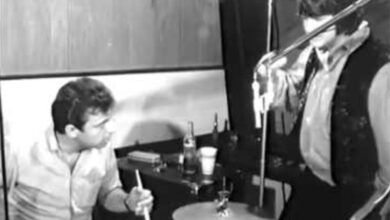Alan Jackson’s Moving Tribute at the 2001 CMA Awards: A Song for a Nation in Mourning
Alan Jackson’s performance of “Where Were You (When the World Stopped Turning)” at the 2001 CMA Awards remains one of the most significant moments in the history of country music. The song, which was inspired by the tragic events of September 11, 2001, captured the raw emotions of a nation in mourning. When Jackson debuted the song just two months after the attacks, it resonated deeply with the audience, creating a powerful and emotional moment that transcended the CMA stage.
Jackson initially had reservations about performing and releasing the song, as he wasn’t sure how it would be received given the sensitive topic. However, the performance was a triumph, not only musically but emotionally, as it provided listeners with a voice for their collective grief. Jackson’s simple and heartfelt lyrics focused on individual experiences and feelings during that tragic day rather than political rhetoric. This approach made the song universally relatable and poignant, with lines like “I’m just a singer of simple songs / I’m not a real political man,” embodying the essence of Jackson’s sincerity and humility.
The CMA Awards performance itself was understated yet powerful. Jackson, standing center stage with his acoustic guitar, delivered the song with an emotional rawness that visibly affected both the live audience and viewers at home. His calm, almost introspective demeanor allowed the lyrics to take center stage, emphasizing the profound questions and reflections the song posed. The simplicity of the performance highlighted the weight of the song’s message, and the audience’s silent respect spoke volumes about its impact.
In the aftermath of the CMA performance, “Where Were You (When the World Stopped Turning)” became an anthem of healing. The song quickly topped the Billboard charts, staying at number one for five weeks. It went on to win numerous awards, including the Grammy Award for Best Country Song and CMA’s Song of the Year. What made the song stand out was its focus on faith, love, and the shared human experience of vulnerability and connection during times of national crisis.
Jackson’s performance in 2001 marked a turning point in his career. Already a well-established artist with hits like “Chattahoochee” and “Gone Country,” the success of “Where Were You” added a new level of depth to his repertoire. Known for his storytelling ability, Jackson solidified his role as a voice for the people, especially during times of national hardship. His ability to tap into the collective consciousness and deliver a message that was both comforting and contemplative demonstrated his exceptional songwriting skills.
Throughout his career, Jackson continued to perform “Where Were You” at his concerts, acknowledging that the song had taken on a life of its own. He often remarked on how the song seemed to have been given to him as a gift, something he couldn’t take full credit for. This sense of humility, paired with the emotional weight of the song, ensured its lasting legacy. Even years after its release, audiences would hold up lighters or cell phones during live performances, moved by the song’s enduring message of faith, hope, and love.
Born in Newnan, Georgia, in 1958, Alan Jackson rose to fame in the late 1980s with his blend of traditional honky-tonk and mainstream country. His smooth baritone and down-to-earth storytelling style quickly made him a favorite in the country music world. Over the years, Jackson has released numerous albums and chart-topping hits, earning multiple CMA, ACM, and Grammy Awards. His body of work is celebrated for its authenticity and its ability to resonate with everyday experiences.
“Where Were You (When the World Stopped Turning)” remains one of the defining moments of Jackson’s career, a song that not only captured a moment in history but also provided comfort and reflection for millions. The simplicity of the song’s structure, paired with the depth of its message, ensured that it would be remembered not just as a tribute to 9/11, but as a timeless reflection on love, faith, and the human spirit. To this day, Jackson’s performance at the 2001 CMA Awards stands as a poignant reminder of music’s power to heal and unite.





